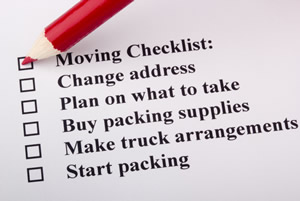Your Complete Moving House Tips Guide!
Book a Removal Company
Once you’ve decluttered your personal belongings and have a rough idea of what you’ll be taking, now you should book your removals company. You could attempt to do it yourself, but it would be a lot of added stress and time. The removal company will have many years’ experience of carefully packing, handling and loading delicate and heavy items so they arrive safely at your new house.
Declutter your Belongings
Decluttering is essential to do every now and then, but it’s even more important before moving house. Before even attempting to pack, you should decide what to sell, donate or throw out. By decluttering, you’ll also keep your house removal costs down too. You’ll be glad of it come moving day and believe us, the removal guys will be glad that they don’t need to shift your lava lamp, inflatable chair and broken down computers.
Pack as Early as Possible
Once you compare surveyors, get conveyancing quotes, and set your moving date, then it’s time to start packing. Make a start on packing as soon as you can. Get together a plan of action with a room by room checklist of how you will pack along with all of the packing material you’ll need.
Create an Inventory
Creating an inventory helps you to keep an eye on all your belongings to make sure nothing is lost throughout the whole moving house process. Following a moving house checklist will also help. Your removal company can create an inventory for you if they have been hired to pack your belongings so this is also worth considering.
Start Packing Least Used Rooms
A good starting point will be rooms and items you use the least. The spare bedroom, garage or attic are usually easy places to start. Leave everyday items until the day before the move and keep any essentials items such as medication separately.

Guide To Moving
Movers wants to enable you with the resources to yourself for an early move with our moving guide. Our moving guide is also a great way to involve the entire family in the move and to spread some of the responsibilities to each person, including your children.
6-8 Weeks Before Moving:
Organization is the key for a smooth move and this is the time to start getting the details of your move.
This is the time to decide what items you wish to transport to your new home. If you decide to dispose of items that you don’t need you should either donate them to a charity or consider having a garage sale. Contact a local charity or pick a date at least two weeks before moving date for the garage sale. Advertise the garage sale locally. Team up with your neighbors who want to sell some of their old belongings, and plan a large neighborhood “sale”.
Start collecting suitable moving and packing supplies if you plan to do your own packing or partial packing. You can purchase all these materials from your agent or a moving supply company. All boxes that you purchase from us or a moving supply company are specially designed for the moving industry to prevent any damages to your belongings. Getting boxes from other sources may create some difficulties when packed in the van. These boxes may be unusual sizes and they may not be strong enough to prevent damages to items packed inside.
Think about your new home layout and start thinking about where you’ll place the furniture. Create a floor plan of your new home that will prevent the stress of making decisions when your furniture arrives at your new home.
Get familiar with your new community. Request information on schools, community programs, parks and recreation from the local Chamber of Commerce.
All travel arrangements (hotel, flights, car rental, etc.) for your family should be made at this time. Try to keep your plan as flexible as possible to accommodate any schedule changes or delays.
Finalize all real estate and rental needs.
Contact your insurance agent to transfer medical, property, fire and auto insurance.
All medical and dental records should be placed in a safe and accessible place. Be sure to include prescription, vaccination records and eyeglass specifications.
Plan on taking all important documents, such as wills, stock certificates, and another one of a kind items (jewelry, coin collection, photos etc.)
4 Weeks Before Move
Submit a Change of Address form to the post office.
Arrange special transportation for your pets and plants.
Contact utility and related companies (gas, electric, oil, water, telephone, cable TV and trash collection) for service disconnect/connect at your old and new addresses. However, remember to keep phone and utilities connected at your current home throughout moving day.
Contact insurance companies (auto, homeowner’s or renter’s, medical and life) to arrange for coverage in your new home.
If you’re packing yourself, purchase moving boxes from your local uhaul. Pack items that you won’t need in the next month.
Plan a garage sale to sell unneeded items or arrange to donate them to charity.
3 Weeks Before Move
Make travel arrangements and reservations for your moving trip. However, don’t make plane reservations for the same day that you’re moving out. House closings are often delayed, and other unexpected situations often arise.
Collect important papers (insurance, will, deeds, stock, etc.).
Arrange to close accounts at your local bank and open accounts in your new location.
2 Weeks before moving
Transfer all prescriptions to a drugstore in your new city. Call your bank to find out how to transfer your accounts. Clear all your safety deposits boxes.
Disassemble and disconnect your computer system before your move. Back up all your computer files on a disk. Consider taking all back up files disks with you in the car. Exposure to extreme temperatures can damage your software.
Make final packing decisions. Clean and clear your home including closets, basement and attics and the items that you will take.
Dispose of items that represent a hazard and are not allowed to be shipped.
Tape and seal all cleaning fluids that are non-toxic, non-flammable in plastic bags.
Drain your lawn mower, snow blower, power tools of all the oil and gasoline to ensure safe transportation.
Schedule appliance disconnection and preparation with a service provider.
If you need to store anything call your van line agent about storage options available.
Inform gas, electric, cable, and telephone services of your move. Arrange to have them disconnected from your present home the day after your scheduled moving day. Sign up for services at your new address and connect them on your moving in day.
Have your automobile serviced if your travel is by car.

RESIDENTIAL MOVING GUIDE
When you move into a new home, there are many details to cover to ensure everything goes smoothly. Knowing what to expect and being prepared ahead of time can help relieve the stress that the moving process can bring.
Begin By Packing Smart
Packing your home for a move is probably the most daunting task associated with moving. Whether you hire professional movers to pack your home or decide to tackle the task yourself, keep these tips for some of the most common items in mind.
Kitchen Items
Besides things you may need for the last few days before you move, most of your kitchen items can be packed ahead of time. Wrap any fragile items in bubble wrap or paper and use crushed paper to fill empty space in boxes. Boxes with dividers work especially well when packing glasses and stemware
Refrigerated or Frozen Foods
It is best to try and use any foods that could spoil if not kept refrigerated. You may also want to consider donating them to friends and neighbors if you cannot use all of the food before you move. If you do take them with you, they will need to be packed in special, refrigerated cartons
Appliances
Make sure to have any appliances that you plan to take with you serviced by a professional. Refrigerators and freezers should be unplugged at least 24 hours prior to your move-out date to thaw. To help absorb unwanted odors, fill a sock with unused coffee grounds and place it inside before securing the doors shut.
Expensive or Sentimental Items
Any items that have a high-dollar or sentimental value should not be packed. It is best to take these items with you personally. This can include anything from jewelry and family photos to personal identification documents and financial records.

Local Moving Guide to Planning Your Move: Costs, Tips & More
Moving to a new home does not have to be a stressful thing. There are steps that anyone can take to get a leg up on the hectic incoming day or to get your personal belongings from one place to another. Aside from planning on how to move your home physically, there are plenty of other challenges that lie in wait. There is the change of address that you will have to schedule out far enough in advance. These tasks include your mail forwarding to your new locale in time and contacting businesses to change your address individually. Thankfully, given proper planning, you can very easily maneuver around your already busy schedule and make all of this go smooth as butter on a warm day.
Why Move Local?
If you plan to move locally, you are a step ahead of those who have to move much further away. By choosing to move nearby, you will cut down on the possible expenses that would otherwise arise when moving across the country, for example. Moving far away can include unforeseen events that moving close to where you already live will only help to avoid.
Tips to Move Smoothly
A piece of good advice for a smooth move is to keep your checklist close at all times. By providing yourself with a written document, just like with any other major event, you can visually keep track of what you have and have not covered. By following a list and checking it twice, you will substantially cut out all possibility of overlooking even the most minute detail. Just be sure to compile them well in advance to moving instead of waiting last minute to jot things down. It will help to alleviate so much stress during your move’s planning phase.
Moving Cost Calculations
Another thing that you should do before starting your move is to calculate precisely how much money you have set aside to get everything done. The worse thing that could happen during a move is that you run out of funds to pay the movers or all of the potential rental fees for renting out a truck and dolly. Unless you know someone with a vehicle who will move you for free, the chances are that you will be stuck hiring at least one professional person with a truck to help you get going. Per this mover, some moving costs to keep in mind include money to pay a moving company, rental fees, travel costs, cleaning costs, moving boxes, and even little things, like tape.
Read The Fine Print
Now that you have changed your address well in advance to moving, put your checklist together, and made a budgeting plan, it’s time to call your local mover to set up a time for them to come by. Before you do make that call, keep in mind that you will need to read everything through before you sign. It is not uncommon for people to try and rush you through the signing process. Always be sure to take as much time as you need to read the fine print of all of your moving agreements to avoid any potential hidden fees. The number one rule of moving is to being prepared before you need to be.
Moving Guide
Organization is the key to a successful move. Follow the guidelines below to make your moving experience a positive one.
6-8 Weeks Before Moving:
Decide where your items are going.
Make a list of items you plan on moving to your new home and items you wish to take This is a great time to “clean house” and determine the items you want to give to charity and the items that you could sell at a garage sale or at your local Consignment Center.
Decide if you are going to hire a professional moving company or move yourself.
If you are hiring a professional moving company, be sure to get several quotes, discuss packing, timing and costs. Make sure they are licensed, bonded and insured.
Many moving expenses are tax deductible
Maintain a file with important information and receipts for moving related expenses.
Prepare a New Home layout
Create a floor plan of your new home and start thinking of where you will place the furniture. Give the floor plan to your moving company so they know where to place each piece of furniture when they arrive.
Moving to a new community
Request information about the schools, parks, recreation, and community programs from the local Chamber of Commerce or Visitor’s Bureau.
4-5 Weeks Before Moving:
Change of Address
Go to your local post office and fill out a US postal change of address form or submit your change of address online Provide your new address to your telephone company, disposal company, cable, water, electric company, internet provider, insurance companies, banks and financial institutions, clubs, local government agencies and any other utility companies.
Register your children in their new schools
Most schools will need proof of your new address so be sure to give them your change of address documentation. Get your kids involved in the moving process. They can help pack their toys and items from their room. Make it fun for them to move!
2-4 Weeks Before Moving:
Contact Utility Companies
Contact your current electricity, gas, phone and other utility companies for disconnection after your scheduled move out. Schedule to have utilities connected to your new home.
Return and Retrieve
Return any library books and anything you have borrowed. Retrieve any items you have loaned out to neighbors and friends.
Start Packing
If possible, pack one room at a time, starting with the rooms that you don’t need to use for the next few weeks. If renting a storage unit, determine which items go to storage and which items go to your new home.
Disassemble your computer
Back up important computer files to a disc or thumbdrive before disconnected. Avoid exposure to extreme temperatures. Pack the hard drive upright and wrap the monitor in bubble wrap to ensure it does not get scratched. Wrap all the wires and cables with rubber bands or twist ties.